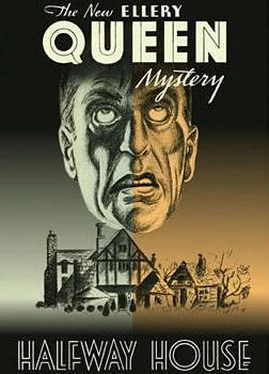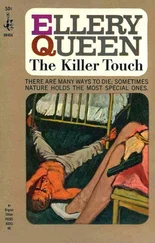The fish-faced man conducted him noiselessly to a suite mysterious with dim lights and velvet hangings, in the midst of which sat a gigantic old man on a wheelchair, enthroned like a dying king. A nurse with forbidding eyes stood guard behind him. There was a brocade dressing-gown over his wing-collar and ascot tie, and a heavy ring with a curious seal on the finger of his gnarled right hand. For an octogenarian he was remarkably well-preserved, Ellery thought, until he noticed the peculiar rigidity of the old man’s left side. The muscles on the left side of his face did not move, and even his left eye stared unwinkingly ahead as the right swam about. It was as if he were composed of two bodies, one alive and one dead.
“How do you do, Mr. Queen,” he said in a rusty bass voice out of the side of his mouth. “Please excuse me for not rising. And let me thank you for your kind and courteous message Saturday night. To what do I owe the pleasure of this visit?”
There was a mustiness in the dark air that was almost necropolitan. Ellery saw that this man was already in his tomb. The cobalt orbits in which his eyes lay were huge and dead. But, studying that grim chin and rhamphoid nose, imbedded in a face the color of unwatered earth, it came to Ellery that old Jasper Borden was still a force to reckon with. The one fierce moving eye made him as uncomfortable as if it had been a potential convulsion of nature. “Good of you to see me, Mr. Borden,” he said quickly. “I shan’t waste time in amenities that can only be painful to you. You know the nature of my interest in the death of your son-in-law?”
“I have heard of you, sir.”
“But Mrs. Gimball—?”
“My daughter has told me everything.”
Ellery paused. “Mr. Borden,” he said at last, “truth is a curious thing. It will not be denied, but one can hasten its inevitability. Since you’ve heard of me, it’s unnecessary for me to assure you that my concern with such tragedies as this is completely detached. Will you answer my questions?”
The sunken moving eye steadied. “You realize, Mr. Queen, what this means to me — to my name, my family?”
“Quite.”
The old man was silent. Then he said, “What do you want to know?”
“I want to know when you first learned that your son-in-law was leading a double life.”
“Saturday night.”
“You had never heard of Joseph Wilson — the man or the name?” The ponderous head shook once, slowly. “Now, I believe you were responsible for your son-in-law’s taking out the million-dollar policy?”
“I was.”
Ellery cleaned the lenses of his pince-nez. “Mr. Borden, did you have any special reason for doing so?”
He fancied that a faint smile lifted the grim blue lips at the right side. “Of a criminal nature, no. My motive was purely one of principle. My daughter did not need her husband’s financial protection. But,” the rusty voice hardened, “in these modern days, when every man is godless and every woman a shameless gadabout, it is good that someone enforce the old-fashioned virtues. I’m a man of the past, Mr. Queen, an anachronism. I still believe in God and the home.”
“And very properly, too,” Ellery hastened to reply. “By the way, of course you did not know that your son-in-law—”
“He was not,” rumbled the octogenarian, “anything of the sort.”
“That Gimball, then—”
Borden said quietly, “He was a dog. A carnal beast. A shame and a degradation to everything people of quality stand for.”
“I understand your feeling thoroughly, Mr. Borden. I meant to ask if you had known of the change he made in his beneficiary?”
“Had I known,” growled the old man, “feeble and chained to this foul chair as I am, I should have throttled him!”
“Mr. — would it be too personal to ask, sir, precisely under what circumstances Gimball courted and married your daughter?” Ellery coughed. “You must understand I use the conventional terms for lack of a more precise phraseology.”
For an instant the fierce eye flashed, then the lid drooped. “These are strange days, Mr. Queen. I never liked Joseph Gimball. It always seemed to me that he was a weakling, a shell of a man, too handsome and irresponsible for his own good. But my daughter fell madly in love with him, and I could not deny my only child her chance for happiness. My daughter, you know,” the bass voice paused, “was unfortunate in her first marriage. Married young, she suffered the tragedy of seeing her first husband, a very worthy young man of unimpeachable family and position, die of lobar pneumonia. When, years later, Gimball came along, Jessica was already forty.” The great right shoulder twitched. “You know how women are.”
“And Gimball’s financial condition at this time?”
“A pauper,” Borden grunted. “His mother was a cunning she-devil, and I’m sure her ambition drove him to the decision to risk bigamy. Joseph Gimball didn’t have the gumption to resist a louse, let alone a creature like his mother. Jessica had a substantial fortune in her own right — a combination of her first husband’s estate and a legacy from my dear wife — and of course I could not permit her to marry without... He had nothing. I took him into my own business. I thought it might work. I gave him every chance.” The voice died off in a dangerous mutter. “The dog, the ungrateful dog. He could have been my son...” The nurse signaled imperiously.
“He managed your affairs, Mr. Borden?”
“That part of them to which he could do the least damage. I have considerable holdings. I presented him with several directorships in corporations I control. In the crash of ’29 and ’30 he lost everything I’d given him. On Black Friday he must have been off in that den of his in Philadelphia, carousing with that woman!”
“And you, Mr. Borden?” asked Ellery with bland respect.
“I was still active then, Mr. Queen,” replied the old man grimly. “They didn’t catch Jasper Borden napping. Now—” the shoulder twitched again — “now I’m nothing, a living corpse. They don’t even let me smoke my cigars any more. They feed me with a spoon like a cursed—”
The nurse was furious; her thumb was stabbing toward the door.
“One thing more,” said Ellery hastily. “Have you always had conscientious objections to divorce, sir?”
For an instant Ellery feared the old millionaire might suffer another stroke. His good eye roved in terrifying circles and his face became suffused with dark blood. “Divorce!” he shouted. “Sinful contrivance of the Devil! No child of mine—” Then he fell silent, muttering. After a while he said in almost a mild voice, “My creed forbids divorce, Mr. Queen. Why do you ask?”
But Ellery murmured: “Thank you, Mr. Borden, you’ve been very kind. Yes, yes, Nurse, I’m going,” and backed to the door.
Someone said behind him, “Mr. Queen,” in a dull voice, and he turned to find Jessica Gimball in ghastly black behind him. The tall figure of Finch loomed nearby.
The dark air was stifling. Ellery said, “Sorry,” and stepped aside. She drifted past him, already unconscious of his presence. Finch sighed as he followed her.
As he walked off he could not help overhearing old Jasper Borden growl pettishly, “Jessica. Get that dying look off your face! Do you hear?” and the middle-aged woman’s submissive, “Yes, Father.”
He went down the stairs furiously thoughtful. Much of the background was clear now that had been obscure. And not the least illuminating fact was that Jasper Borden, dying hulk that he was, still ruled his household with an unweakened scepter.
The fish-faced man downstairs looked annoyed, insofar as it was possible for him to express any emotion whatever, when Ellery politely asked to be announced to Miss Andrea Gimball instead of leaving the sacred domain. When Andrea appeared from an inner chamber he stood to one side, stiffly, as if it were his duty to protect her from invasion. At her heels shambled Burke Jones in a dinner jacket, his arm rather sumptuously trussed in a black silk sash.
Читать дальше












